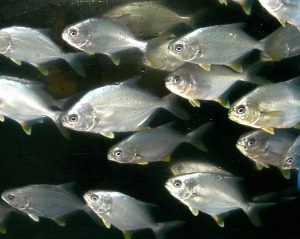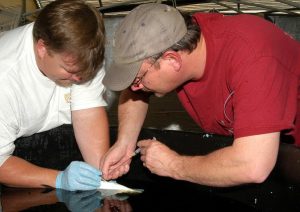A publication co-authored by scientists from NCCOS, NOAA Sea Grant, and four other institutions identifies the Florida pompano as a marine finfish species that will contribute to the expansion of U.S. domestic aquaculture in the future. The publication represents decades of collaboration and experience by the authors in pompano aquaculture. It demonstrates how a long-term vision and research partnerships can converge to advance technology readiness for high-value marine species.

Juvenile Florida pompano, Trachinotus carolinus, produced in a recirculating aquaculture system. Credit: K. Riley, NOAA NCCOS.
Interest and efforts to expand sustainable U.S. aquaculture have increased rapidly over the last two decades. Among these advances are expanded tools and technology, as well as the identification of new candidate species whose life history and environmental requirements adapt readily to cultivation in land-based or offshore facilities (see NCCOS aquaculture video).
The Florida pompano (Trachinotus carolinus), a member of the jack family (Carangidae), is highly prized by both commercial and recreational anglers. Pompano are schooling warm-water pelagic finfish found in shallow near-shore waters along sandy beaches as well as estuarine areas adjacent to the coasts of the eastern Atlantic Ocean from Massachusetts to Brazil and throughout the Gulf of Mexico. In U.S. coastal waters, pompano are found mainly from North Carolina to Florida with their highest abundance along the coasts of Florida.
Although Florida pompano remains a prominent menu item at a number of high-end restaurants on the U.S. East Coast as well as the Gulf of Mexico, this species is not well known outside of these regions. There is considerable room to develop and expand the market for this species, especially inland.
The publication discusses Florida pompano’s current status, aquaculture history, reproduction and larviculture, rearing and growout, nutrition and feed development, diseases and their management, and economics and marketing. The publication identifies six research needs giving a brief overview of each: 1) broodstock domestication, selective breeding, and genetic improvement; 2) delayed maturation; 3) diet development and refinement; 4) disease management strategies; 5) economics and business planning; 6) market development and expansion.

The authors Dr. Ken Riley (NCCOS, left) and Dr. Charles Weirich (Sea Grant, right) collect an egg sample used to determine the condition of Florida pompano for spawning trials. Credit: K. Riley, NOAA NCCOS.
There is currently a paucity of information available with respect to the economics of Florida pompano aquaculture using production systems presently employed. There has been little research undertaken to date to develop economic models for the commercial production of pompano utilizing ocean net pens and what information available is considered proprietary. As the level of investment and financial risks required for any aquaculture venture is high, it is considerably higher for offshore operations.
Economics will play an important role in permitting and legal review, site selection, engineering, production planning, and market evaluation as the aquaculture industry moves into the open ocean. In addition to the lack of information with respect to economics of ocean net pens, there is limited information available regarding land-based recirculating aquaculture system technology production.
The authors conclude that after several decades of research and development, commercial aquaculture of Florida pompano is established, albeit currently on a relatively small scale. Although there is good potential for further development and expansion of pompano farming in the U.S. as well as abroad, there remains a continued need to build upon the knowledge base with respect to this species to address biological, economical and social issues.
Citation: Weirich, Charles R., Kenneth L. Riley, Marty Riche, Kevan L. Main, Paul S. Wills, Gonzalo Illán, David S. Cerino and Timothy J. Pfeiffer. 2021. The status of Florida pompano, Trachinotus carolinus, as a commercially ready species for U.S. marine aquaculture. Journal of the World Aquaculture Society 52(3): 731-763. https://doi.org/10.1111/jwas.12809
 Official websites use .gov
A .gov website belongs to an official government organization in the United States.
Official websites use .gov
A .gov website belongs to an official government organization in the United States. Secure .gov websites use HTTPS
A lock or https:// means you’ve safely connected to the .gov website. Share sensitive information only on official, secure websites.
Secure .gov websites use HTTPS
A lock or https:// means you’ve safely connected to the .gov website. Share sensitive information only on official, secure websites.